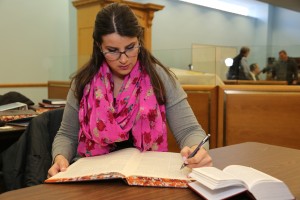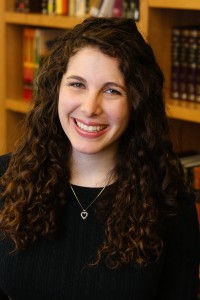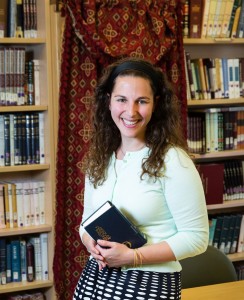Local clergy react to Orthodox Union ruling that bars women clergy
By JTA and CCJN Staff
Local clergy reacted to a new policy from the Orthodox Union (OU) barring women from serving as clergy at its 400 member congregations across the United States.

Rabba Ramie Smith was ordained in 2016 and is now a clergy member at the Hebrew Institute of Riverdale, an Orthodox synagogue in New York. (Courtesy of Smith)
Adopted at a board meeting Feb. 1 and reported Thursday in the Forward, the ruling cites Jewish law, or halacha (Jewish legal tradition), in declaring that “a woman should not be appointed to serve in a clergy position.”
The ruling bars women from holding a title such as “rabbi,” or even from serving without title in a role in which she would be performing “common” clergy functions. It lists those functions as ruling on halachic matters, officiating at lifecycle events, “delivering sermons from the pulpit during services, presiding over or ‘leading services’ at a minyan and formally serving as the synagogue’s primary religious mentor, teacher, and spiritual guide.”
Seven leading modern Orthodox rabbis contributed to the ruling — a response to a small number of synagogues that have hired female clergy ordained by institutions representing a left-wing, or “open” faction, within modern Orthodoxy. Yeshivat Maharat, a New York-based yeshiva, has already graduated 14 female Jewish clergy.
Congregation Beth Israel’s Rabbi Gabriel Greenberg, who has been supportive of efforts to engage females as Orthodox clergy elsewhere, responded in an email to the CCJN. “I have deep respect and admiration for the Talmidei Chachamim (noted Torah scholars) whose opinions and psakim (renderings of Jewish law) are described in the OU statement,” he began. “That being said, I think a key line within it is the following: ‘many Orthodox Union synagogue rabbis, and their lay leadership, have requested the Orthodox Union to serve as a conduit for definitive guidance in this complex arena.'”

Leah Sarna, due to receive ordination in 2018, opposes the O.U. decision but appreciates the Jewish legal process that guided it. (Courtesy of Sarna)
Greenberg continued: “I think it is powerful that many OU shuls in the country have reached out to the OU for guidance here, and I am sure that it is appropriate for many of them. However, Congregation Beth Israel in Metairie was not one of these shuls who asked for such a ruling (nor were many of our sister synagogues around the country). We neither requested a psak on the matter, nor were we consulted as to the particular circumstances and situation of our community.
“As such, Beth Israel will continue to follow its tradition of the last century in articulating its own shul policy – on this and all matters – in accordance with both the halacha and the context of our own particular communal circumstances, makeup, and environment,” he concluded.
Rabbi Yochanan Rivkin, the interim rabbi at Congregation Anshe Sfard, the New Orleans Orthodox synagogue, declined to comment on the record, but did acknowledge that the ruling would have little effect on his congregation. Rivkin, who is the son of Rabbi Zelig Rivkin, the head of Chabad-Lubavitch of Louisiana, did acknowledge that the Chabad model of shluchim (emissaries) accepts women as spiritual partners with their rabbinic spouses, which might be at odds with some of the far-reaching aspects this ruling may have.
Touro Synagogue’s Rabbi Alexis Berk, one of two female senior New Orleans area rabbis, responded to the ruling via email stating “Sadly, I feel this is just something i can’t really comment on with any insight or nuance.”
“I have two things to say,” said Rabbi Deborah Silver from Shir Chadash Conservative Congregation. “The first is that obviously this is not my movement. Nonetheless, I am sad to see things move in this direction and my concern is for the women who are actively working as clergy within the movement.
According to the Forward, at least four synagogues that are members of the Orthodox Union currently employ women in clergy roles.
Representatives and champions of such groups expressed disappointment at the new policy.

Lila Kagedan, the first Orthodox woman to use the title “rabbi” and a graduate of the Maharat yeshiva in Riverdale, New York. (Photo courtesy of Kagedan)
“There are various ways of practicing Judaism, halachic Orthodox Judaism,” Sharon Weiss-Greenberg, executive director of the Jewish Orthodox Feminist Alliance, told the Forward. “We are disappointed, however, that the OU is attempting to squash that healthy debate and impose their [religious ruling] on hundreds of synagogues, thus centralizing power … and not giving autonomy to communities’ lay and professional leaders.”
In a statement accompanying the ruling, the Orthodox Union asserted that the “synagogue experience would be enhanced by … an even greater presence of women functioning as educated, knowledgeable and halachically committed role models, teachers, and pastoral counselors,” and that it would encourage dialogue in order for women within Orthodoxy to “assume greater lay and professional roles” and to remove “barriers that impede women from further contributing to our community, in halachically appropriate ways.”
Rabbi Robert Loewy of Congregation Gates of Prayer wanted to read the actual ruling before making any further statements on his own behalf or that of his assistant rabbi, Alexis Pinsky, the only other local area female pulpit rabbi.
He noted that the statement issued by the OU shows a struggle within. “Clearly they are not there yet, but the fact that they are struggling is positive,” he wrote in an email to the CCJN, “Just as Reform and Conservative Judaism have been enriched in numerous ways by professional equality, with outstanding rabbis, cantors and educators of all genders, the same could be true for the Orthodox Jewish world.”


